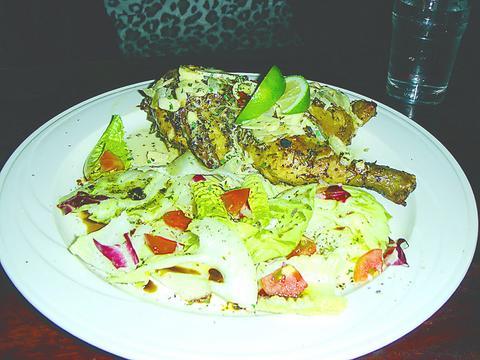It could be considered incongruous, eating a slice of pizza while sipping a thick yogurt drink called a lassi. At a time when fusion cooking, or mix and match, is all the rage, Peacock in the Shida section of Taipei is blazing a trail for local foodies.
Peacock, which opened in late March, is the product of two college classmates and one of their brothers, who grew weary of the daily grind and wanted instead to try their hand at something more entrepreneurial.

PHOTO: CHRIS FUCHS, TAIPEI TIMES
It's neither a restaurant nor a bar, neither a cafe nor lounge. Rather, Peacock prides itself on not being pigeonholed, as evidenced by its food, spirit selection and decor.
"The atmosphere is very laid-back here," said Barbie Chang, describing the dimly lit, dark-wood interior design of Peacock. "If people see attractive lighting and colorful decorations, they'll want to come."
Chang said they chose the name Peacock because the brightly colored male bird, a Hindu god, represents good luck in India. Indeed, a good deal of Peacock's influence is drawn from Indian culture. Before opening the place in March, Chang and another co-owner, Angel Guo, traveled to India and enrolled in cooking classes for a couple of weeks.
Besides bringing back traditional Indian knickknacks, they also returned with a recipe for a yogurt-based beverage called lassi. "It especially helps with digestion," Guo said.
Peacock's lassi had the consistency of a thick shake and tasted like yogurt, which is just as well, because that's what it's made of. To Peacock's credit, they make the yogurt fresh from milk and cultures.
Pizza is found relatively easily in Taiwan, but it's often inedible. Peacock's pizza uses a paper-thin crust and comes in a number of varieties: plain, seafood, vegetable, or with fruit.
The Margherita, at NT$250, is the no-frills choice made from mozzarella and tomato sauce. Fortunately, the pizza had none of that pre-frozen-heated-on-the-spot taste associated with commerical chains. A Belgian beer like Chimay, dark in color and nutty in flavor, complements the Margherita.
Guo said they planned to expand the menu's selections after returning from another trip to India in November. Currently, Peacock succeeds without rigidly defining itself and is bound to offer something to please most people's pallettes.

April 14 to April 20 In March 1947, Sising Katadrepan urged the government to drop the “high mountain people” (高山族) designation for Indigenous Taiwanese and refer to them as “Taiwan people” (台灣族). He considered the term derogatory, arguing that it made them sound like animals. The Taiwan Provincial Government agreed to stop using the term, stating that Indigenous Taiwanese suffered all sorts of discrimination and oppression under the Japanese and were forced to live in the mountains as outsiders to society. Now, under the new regime, they would be seen as equals, thus they should be henceforth

Last week, the the National Immigration Agency (NIA) told the legislature that more than 10,000 naturalized Taiwanese citizens from the People’s Republic of China (PRC) risked having their citizenship revoked if they failed to provide proof that they had renounced their Chinese household registration within the next three months. Renunciation is required under the Act Governing Relations Between the People of the Taiwan Area and the Mainland Area (臺灣地區與大陸地區人民關係條例), as amended in 2004, though it was only a legal requirement after 2000. Prior to that, it had been only an administrative requirement since the Nationality Act (國籍法) was established in

Three big changes have transformed the landscape of Taiwan’s local patronage factions: Increasing Democratic Progressive Party (DPP) involvement, rising new factions and the Chinese Nationalist Party’s (KMT) significantly weakened control. GREEN FACTIONS It is said that “south of the Zhuoshui River (濁水溪), there is no blue-green divide,” meaning that from Yunlin County south there is no difference between KMT and DPP politicians. This is not always true, but there is more than a grain of truth to it. Traditionally, DPP factions are viewed as national entities, with their primary function to secure plum positions in the party and government. This is not unusual

US President Donald Trump’s bid to take back control of the Panama Canal has put his counterpart Jose Raul Mulino in a difficult position and revived fears in the Central American country that US military bases will return. After Trump vowed to reclaim the interoceanic waterway from Chinese influence, US Defense Secretary Pete Hegseth signed an agreement with the Mulino administration last week for the US to deploy troops in areas adjacent to the canal. For more than two decades, after handing over control of the strategically vital waterway to Panama in 1999 and dismantling the bases that protected it, Washington has